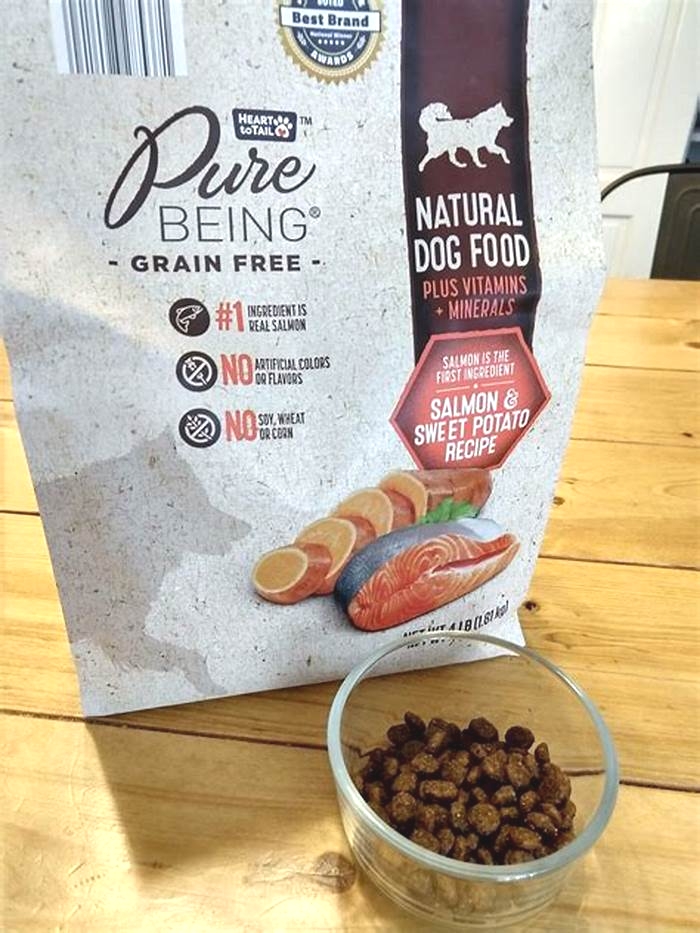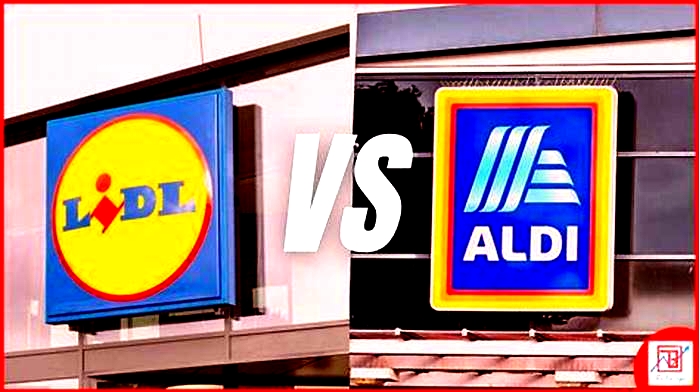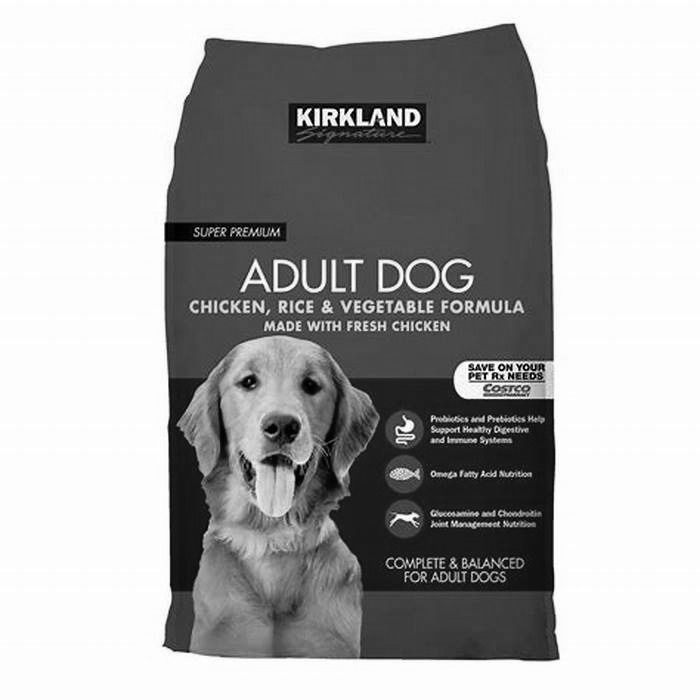how does costco dog food compare

Costco Kirkland Dog Food Review (Dry)
Each recipe includes its AAFCO nutrient profile: Growth (puppy), Maintenance (adult), All Life Stages, Supplemental or Unspecified.
The Costco Kirkland product line includes the 6 dry dog foods listed below.
Ingredients Analysis
The first ingredient in this recipe is chicken. Although it is a quality item, raw chicken contains up to 73% water. After cooking, most of that moisture is lost, reducing the meat content to just a fraction of its original weight.
After processing, this item would probably account for a smaller part of the total content of the finished product.
The second ingredient is chicken meal. Chicken meal is considered a meat concentrate and contains nearly 300% more protein than fresh chicken.
The third item is brown rice, a complex carbohydrate that (once cooked) can be fairly easy to digest. However, aside from its natural energy content, rice is of only modest nutritional value to a dog.
The next ingredient is barley. Barley is a starchy carbohydrate supplying fiber and other healthy nutrients. However, aside from its energy content, this cereal grain is of only modest nutritional value to a dog.
The fifth ingredient is chicken fat. This item is obtained from rendering chicken, a process similar to making soup in which the fat itself is skimmed from the surface of the liquid.
Chicken fat is high in linoleic acid, an omega-6 fatty acid essential for life. Although it doesnt sound very appetizing, chicken fat is actually a quality ingredient.
The sixth ingredient is egg product, an unspecified (wet or dry?) form of shell-free eggs. Quality can vary significantly. Lower grade egg product can even come from commercial hatcheries from eggs that failed to hatch.
In any case, eggs are easy to digest and have an exceptionally high biological value.
The seventh ingredient is beet pulp, which is a controversial ingredient, a high fiber by-product of sugar beet processing.
Some denounce beet pulp as an inexpensive filler while others cite its outstanding intestinal health and blood sugar benefits.
We only call your attention here to the controversy and believe the inclusion of beet pulp in reasonable amounts in most dog foods is entirely acceptable.
The next ingredient is potato. Potatoes can be considered a gluten-free source of digestible carbohydrates. Yet with the exception of perhaps their caloric content, potatoes are of only modest nutritional value to a dog.
The ninth ingredient is fish meal, another protein-rich meat concentrate.
Fish meal is typically obtained from the clean, dried, ground tissue of undecomposed whole fish and fish cuttings of commercial fish operations.1
Unfortunately, this particular item is anonymous. Because various fish contain different types of fats, we would have preferred to have known the source species.
From here, the list goes on to include a number of other inclusions.
But to be realistic, ingredients located this far down the list (other than nutritional supplements) are not likely to affect the overall rating of this Costco product.
With 6 notable exceptions
First, flaxseed is one of the best plant sources of healthy omega-3 fatty acids. Provided theyve first been ground into a meal, flax seeds are also rich in soluble fiber.
However, flaxseed contains about 19% protein, a factor that must be considered when judging the actual meat content of this dog food.
Next, brewers yeast can be a controversial item. Although its a by-product of the beer making process, this ingredient is rich in minerals and other healthy nutrients.
Fans believe yeast repels fleas and supports the immune system.
Critics argue yeast ingredients can be linked to allergies. This may be true, but (like all allergies) only if your particular dog is allergic to the yeast itself.
In addition, a vocal minority insists that yeast can increase the risk of developing the life-threatening condition known as bloat. However, this is a claim weve not been able to scientifically verify.
In any case, unless your dog is specifically allergic to it, yeast can still be considered a nutritious additive.
Whats more noteworthy here is that brewers yeast contains about 48% protein, a factor that must be considered when judging the actual meat content of this dog food.
This recipe includes peas, which are a quality source of carbohydrates. And like all legumes, theyre rich in natural fiber.
However, peas contain about 25% protein, a factor that must be considered when judging the meat content of this dog food.
In addition, chicory root is rich in inulin, a starch-like compound made up of repeating units of carbohydrates and found in certain roots and tubers.
Not only is inulin a natural source of soluble dietary fiber, its also a prebiotic used to promote the growth of healthy bacteria in a dogs digestive tract.
Next, sodium selenite is a controversial form of the mineral selenium. Sodium selenite appears to be nutritionally inferior to the more natural source of selenium found in selenium yeast.
And lastly, this food contains chelated minerals, minerals that have been chemically attached to protein. This makes them easier to absorb. Chelated minerals are usually found in better dog foods.
Nutrient Analysis
Based on its ingredients alone, Kirkland Signature Dog Food looks like an above-average dry product.
The dashboard displays a dry matter protein reading of 29%, a fat level of 18% and estimated carbohydrates of about 45%.
As a group, this Kirkland brand features an average protein content of 28% and a mean fat level of 15%. Together, these figures suggest a carbohydrate content of 49% for the overall product line.
And a fat-to-protein ratio of about 53%.
Which means this Kirkland product line contains
Above-average protein. Near-average fat. And near-average carbs when compared to other kibbles.
Even when you consider the protein-boosting effect of the flaxseed, peas and brewers yeast, this looks like the profile of a dry dog food containing a significant amount of meat.
How Costcos Kirkland Signature Dog Food Stacks Up Against Leading Brands
Welcome, dog lovers! Today, were embarking on a culinary journey for our four-legged friends, exploring the world of dog food, particularly Costcos Kirkland Signature brand. Well compare it to other popular brands, diving deep into what makes each unique. Get ready for a tail-wagging adventure into the realm of canine nutrition!
Price Comparison: Kirkland Signature vs. The Pack
When it comes to feeding our furry friends, budget matters. Lets see how Kirkland Signatures pricing plays in the dog park:
- Kirkland Signature:
- Price Range: $1.50 $2.50 per pound
- Value: Unbeatable for the quality
- Other Brands:
- Price Range: $3 $6 per pound
- Brands Included: Purina Pro Plan, Royal Canin, Hills Science Diet, IAMS
- Value: Higher cost, but does it mean higher quality?
Ingredient Showdown: Whats in the Bowl?
Ingredients are the heart of any dog food. Lets sniff out whats inside:
- Kirkland Signature:
- Key Ingredients: Real meat, whole grains, vegetables
- Specialty: Grain-free options, no artificial nasties
- Other Brands:
- Key Ingredients: Varies significantly
- Specialty: Some match Kirklands quality, others use fillers
Nutritional Face-Off: Feeding for Health
A balanced diet is key for a happy, healthy pooch. How do these brands measure up?
- Kirkland Signature:
- Nutrition: AAFCO compliant, balanced for all dogs
- Specialty: Universal formulas
- Other Brands:
- Nutrition: Breed/life stage specific options
- Specialty: Tailored nutrition, but research is essential
Variety: The Spice of Life
Diversity in diet can be as important for dogs as it is for us. Lets compare:
- Kirkland Signature:
- Variety: Limited but focused
- Options: Dry kibble, wet food
- Other Brands:
- Variety: Extensive
- Options: Dry, wet, grain-free, prescription diets
Overall Quality: Whats Best for Your Best Friend?
Quality is king, but its also subjective. Heres the scoop:
- Kirkland Signature:
- Quality: High for the price, occasional inconsistency
- Reputation: Strong among budget-conscious owners
- Other Brands:
- Quality: A mixed bag, dependent on brand and formula
- Reputation: Research is key
Conclusion
In the dog-eat-dog world of pet food, Kirkland Signature emerges as a strong contender, especially for those watching their wallets. It offers a balance of quality ingredients, nutritional adequacy, and affordability. However, the best choice for your dog may vary based on individual needs, breed, and health conditions. Always consult your vet, and remember, a happy dog is a well-fed dog!
Key Takeaways:
- Budget-Friendly: Kirkland Signature is a wallet-friendly option without compromising on quality.
- Ingredient Integrity: Real meat and wholesome grains take the lead in Kirklands recipes.
- Nutritional Balance: Adequate for most dogs, but specific needs might require different brands.
- Variety: Limited in Kirklands range but sufficient for general needs.
- Quality Check: While generally good, occasional inconsistencies mean keeping a watchful eye.
Remember, every dog is unique, and their food should be too!
FAQs: Dog Nutrition
1. How Does Kirkland Dog Foods Protein Content Compare to Other Brands?
Kirkland Signature: Typically, it boasts a protein content that hovers around 25-30%, sourced primarily from real meat. This level is ideal for maintaining muscle health without overburdening the dogs digestive system.
Other Brands: Protein content can swing widely, from 20% in some budget brands to over 30% in premium lines. Brands like Orijen may push towards 38%, catering to a high-protein diet philosophy.
2. Are There Unique Health Benefits in Kirkland Dog Food Not Found in Others?
Kirkland Signature: Its enriched with probiotics, crucial for gut health, and often includes chondroitin and glucosamine, supporting joint health. These additions are not universally found in all dog foods.
Other Brands: Some, like Blue Buffalo, emphasize antioxidant-rich ingredients for immune support, while others may focus on omega fatty acids for coat health.
3. What Are the Differences in Preservative Use Between Kirkland and Other Brands?
Kirkland Signature: Leans towards natural preservatives like vitamin E (mixed tocopherols). This approach is healthier but may reduce shelf life slightly.
Other Brands: The use of preservatives varies. While many are moving towards natural options, some still use artificial preservatives like BHA and BHT, which have raised health concerns.
4. How Does Kirklands Approach to Allergies Compare with Other Brands?
Kirkland Signature: Offers grain-free options and typically avoids common allergens like corn, wheat, and soy. This makes it a suitable choice for dogs with sensitivities.
Other Brands: Specialized hypoallergenic formulas are available from brands like Royal Canin and Hills Prescription Diet, specifically targeting dogs with specific dietary allergies.
5. Sustainability and Ethical Sourcing: Kirkland vs. Others
Kirkland Signature: While Costco is known for its commitment to sustainability, specific details on the sourcing of ingredients for their dog food are less transparent.
Other Brands: Brands like Acana and Orijen pride themselves on locally sourced, sustainable ingredients, often providing detailed information about their sourcing practices.
6. How Do Life Stage Formulations Differ Among Brands?
Kirkland Signature: Offers a range of products catering to different life stages, from puppies to seniors, ensuring age-appropriate nutrition.
Other Brands: Some go further in specialization. For instance, Royal Canin offers breed-specific formulas, addressing the unique nutritional needs of different dog breeds at various life stages.
7. The Role of Carbohydrates in Kirkland Dog Food Compared to Others
Kirkland Signature: Uses complex carbohydrates like sweet potatoes and brown rice, providing sustained energy and aiding in digestive health.
Other Brands: Carbohydrate sources vary widely. Some premium brands may use low-glycemic options like legumes, while others might rely on simpler carbs like white rice or corn.
8. What Sets Kirkland Apart in Terms of Flavor and Palatability?
Kirkland Signature: Focuses on natural meat flavors, which are generally well-received by dogs. However, it doesnt use artificial flavor enhancers.
Other Brands: Some may incorporate more diverse flavor profiles, using natural and artificial means to enhance taste, especially in therapeutic or prescription diets.
9. Are There Differences in Caloric Density Between Kirkland and Other Brands?
Kirkland Signature: Tends to have a moderate caloric density, making it suitable for dogs with average activity levels.
Other Brands: High-performance brands may offer higher caloric content for very active dogs, while weight management formulas from various brands provide lower calorie options.
10. How Do Kirkland and Other Brands Address Weight Management in Dogs?
Kirkland Signature: Offers weight management formulas with reduced fat and calorie content, while maintaining nutritional balance.
Other Brands: Some, like Purina, have developed specialized weight loss diets clinically proven to aid in weight management, often incorporating higher fiber content for satiety.
11. Impact of Kirkland Dog Food on Digestive Health Compared to Other Brands
Kirkland Signature: Its inclusion of probiotics and easily digestible grains like brown rice supports a healthy digestive system. This is particularly beneficial for dogs with sensitive stomachs.
Other Brands: Some, like Hills Science Diet, focus intensely on digestive health, offering specialized formulas with prebiotic fibers and highly digestible proteins.
12. Analysis of Omega Fatty Acid Content: Kirkland vs. Competitors
Kirkland Signature: Generally includes a balanced omega-3 and omega-6 fatty acid profile, contributing to healthy skin and coat. Fish-based formulas are particularly rich in these nutrients.
Other Brands: Brands like Orijen and Acana emphasize exceptionally high levels of omega fatty acids, often using multiple fish sources, which can be advantageous for dogs with skin issues.
13. Understanding the Grain-Free Debate: Kirklands Stance vs. Other Brands
Kirkland Signature: Offers grain-free options, responding to customer demand, though its important to note the FDAs investigation into a potential link between grain-free diets and heart issues in dogs.
Other Brands: The response varies; while some brands heavily market grain-free products, others, like Purina, offer both grain-inclusive and grain-free options, providing a wider choice for concerned pet owners.
14. Evaluating the Use of Meat By-Products in Kirkland Dog Food
Kirkland Signature: Prioritizes real meat as the first ingredient and generally avoids using meat by-products, aligning with consumer preferences for whole, identifiable ingredients.
Other Brands: Some brands, particularly in the budget sector, may include meat by-products as a protein source. While not necessarily harmful, this can be less appealing to some pet owners.
15. The Role of Antioxidants in Kirkland Dog Food vs. Other Brands
Kirkland Signature: Incorporates a range of antioxidants from natural sources like fruits and vegetables, supporting overall health and immune function.
Other Brands: Premium brands may emphasize unique antioxidant-rich ingredients like blueberries or kale, targeting specific health benefits like improved cognitive function in aging dogs.
16. How Do Kirkland and Other Brands Address Dental Health in Dogs?
Kirkland Signature: While not specifically focused on dental health, the physical properties of its kibble can aid in reducing plaque and tartar buildup.
Other Brands: Some, like Royal Canin, offer specialized dental health formulas, with kibble designed to mechanically clean teeth or ingredients that reduce tartar formation.
17. Comparison of Shelf Life and Storage Recommendations
Kirkland Signature: Due to its use of natural preservatives, it may have a slightly shorter shelf life compared to some brands using artificial preservatives. Proper storage in a cool, dry place is recommended.
Other Brands: Shelf life can vary significantly, with some brands offering products with extended shelf stability due to different preservative techniques.
18. Exploring the Use of Exotic Proteins in Dog Food: Kirkland and Others
Kirkland Signature: Sticks to more traditional protein sources like chicken, beef, and lamb, catering to general dietary needs and preferences.
Other Brands: Brands like Taste of the Wild and Zignature offer exotic protein options like bison, kangaroo, or venison, catering to dogs with allergies to common proteins or for owners seeking novel diets.
19. How Do Kirkland and Other Brands Cater to Active and Working Dogs?
Kirkland Signature: Offers formulas with balanced nutrition suitable for moderately active dogs, but may not meet the higher energy demands of working or highly active dogs.
Other Brands: Some brands, like Eukanuba, specifically cater to the high-energy needs of working and athletic dogs, with increased protein and fat content for sustained energy.
20. Addressing the Needs of Senior Dogs: Kirkland vs. Other Brands
Kirkland Signature: Provides senior dog formulas with adjusted nutrient profiles to support aging joints, cognitive health, and lower energy requirements.
Other Brands: Many have specialized senior diets, like Blue Buffalos Senior formula, which may include supplements like DHA for brain health or enhanced levels of glucosamine and chondroitin for joint support.
HELP US PUT FOOD ON THE TABLE




